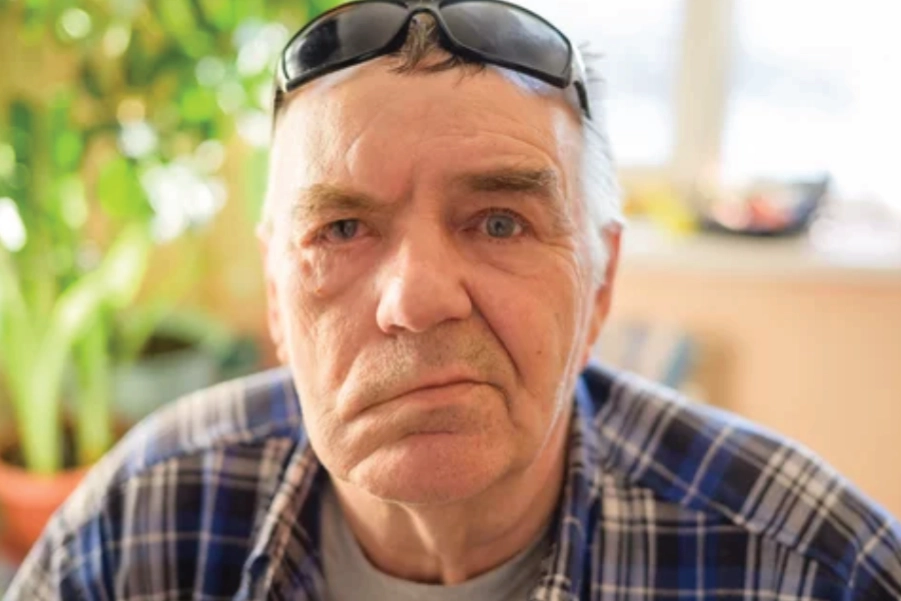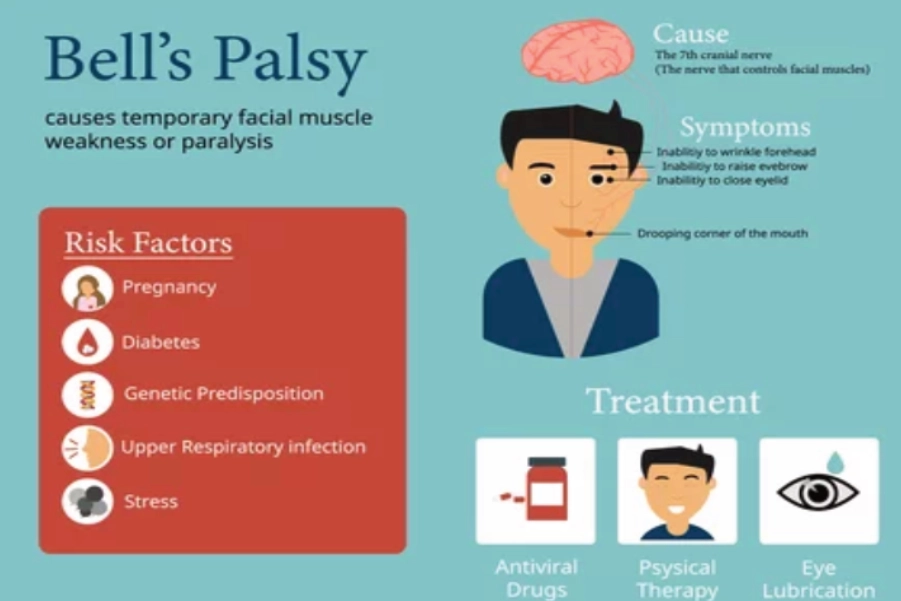Best Physiotherapy for Bell's palsy You Can Trust
Trust “Best Physiotherapy for Bell’s palsy ” for tailored rehabilitation, integrating evidence-based techniques to maximize recovery and restore independence. Our compassionate care and dedicated support aim to guide people affected by Bell’s palsy towards improved quality of life.
Best Bell's palsy physiotherapy Doctors in Delhi, India

Physiotherapy for Bell's palsy
Bell's palsy Physiotherapy in Delhi
Bell’s palsy is a condition characterized by sudden weakness or paralysis of facial muscles, typically on one side of the face. Rehabilitation focuses on restoring facial muscle function through techniques like facial exercises, massage, and electrical stimulation. Speech therapy may also be employed to address difficulties with articulation and swallowing, aiding in the recovery process. Multidisciplinary support helps individuals regain facial symmetry and function, improving quality of life.
What is Bell's palsy
Bell's palsy is a condition characterized by the sudden onset of facial muscle weakness or paralysis, typically affecting one side of the face. It is caused by inflammation or compression of the facial nerve, leading to symptoms such as drooping of the eyelid or mouth, difficulty closing one eye, and impaired facial expressions. While the exact cause is often unknown, viral infections, such as herpes simplex virus, are thought to play a role. Most cases of Bell's palsy resolve spontaneously within a few weeks to months, but rehabilitation interventions may be employed to aid in recovery and restore facial muscle function.
Causes of Bell's palsy
Bell’s palsy, a condition characterized by sudden weakness or paralysis of the facial muscles on one side of the face, can occur due to several factors.
While the exact cause of Bell’s palsy remains unclear in many cases, it is generally believed to be multifactorial, involving a combination of viral infections, inflammation, immune responses, and environmental factors. Prompt medical evaluation and treatment are essential for managing Bell’s palsy and minimizing complications.
Here are some common causes: VIRAL INFECTION I INFLAMMATION I IMMUNE SYSTEM RESPONSE I ENVIRONMENTAL FACTORS I GENETIC PREDISPOSITION I OTHER MEDICAL CONDITIONS I TRAUMA OR INJURY

Treatment of Bell's palsy
Treatment for Bell's palsy aims to reduce inflammation, relieve symptoms, and promote recovery of facial nerve function. Here are common approaches:
CORTICOSTEROIDS:
Oral corticosteroids, such as prednisone, are often prescribed to reduce inflammation and swelling of the facial nerve. Early initiation of corticosteroid treatment within 72 hours of symptom onset has been shown to improve outcomes and accelerate recovery in some cases.
ANTIVIRAL MEDICATIONS:
Although the role of antiviral medications in the treatment of Bell's palsy remains controversial, some healthcare providers may prescribe antiviral drugs such as acyclovir or valacyclovir to target viral infections that may contribute to facial nerve inflammation.
EYE CARE:
Protecting the affected eye from dryness, irritation, and exposure to foreign particles is essential to prevent complications such as corneal abrasions and ulcers. Lubricating eye drops or ointments, wearing an eye patch during sleep, and practicing gentle eyelid closure exercises can help maintain eye moisture and protect vision.
PHYSIOTHERAPY:
Physiotherapy techniques such as facial exercises, soft tissue manipulation, and electrical stimulation recommended to promote muscle strength, flexibility, and coordination in the affected side of the face. These exercises help prevent muscle atrophy, improve facial symmetry, and enhance overall facial function.
SURGICAL INTERVENTION:
In rare cases of severe or persistent Bell's palsy, surgical interventions such as decompression of the facial nerve or facial reanimation procedures may be considered to relieve pressure on the nerve, repair nerve damage, or restore facial symmetry and function. However, surgical options are typically reserved for individuals who do not respond to conservative treatments or experience significant facial disfigurement.
It is essential for individuals diagnosed with Bell's palsy to work closely with healthcare providers to develop a personalized treatment plan tailored to their specific needs and preferences. Early intervention, comprehensive care, and diligent follow-up are key to optimizing outcomes and facilitating recovery from Bell's palsy.
Physiotherapy Treatment for Bell's palsy
Physiotherapy treatment for Bell’s palsy focuses on restoring facial muscle function through various techniques such as facial exercises, massage, electrical stimulation, and biofeedback. These interventions aim to improve muscle strength, coordination, and mobility, promoting facial symmetry and functional recovery. Additionally, speech therapy may be employed to address any difficulties with speech articulation and swallowing associated with Bell’s palsy.
When to Start Physiotherapy After Bell's palsy
Physiotherapy for Bell’s palsy should ideally commence as soon as the condition is diagnosed to maximize the effectiveness of treatment. Early intervention can help prevent muscle atrophy, improve facial muscle function, and promote faster recovery.
Physiotherapy & After Bell's palsy
Multiple sclerosis (MS) rehabilitation typically includes a multidisciplinary approach involving various healthcare professionals. Components may include:
Physiotherapy plays a crucial role in the rehabilitation process following Bell’s palsy, aiming to restore facial muscle strength, mobility, and coordination. Here’s an overview of physiotherapy treatment after Bell’s palsy:
FACIAL EXERCISES:
Physiotherapists prescribe specific facial exercises to strengthen and retrain the muscles affected by Bell’s palsy. These exercises target different muscle groups and focus on improving facial symmetry, range of motion, and control. Common exercises include smiling, frowning, raising the eyebrows, puffing out the cheeks, and pursing the lips.
SOFT TISSUE MANIPULATION:
Gentle soft tissue manipulation techniques may be used to stimulate blood circulation, reduce muscle tension, and promote relaxation in the facial muscles. Massage can help alleviate pain, stiffness, and discomfort associated with Bell’s palsy while facilitating muscle recovery and improving tissue elasticity.
ELECTRICAL STIMULATION:
Electrical stimulation therapy, such as neuromuscular electrical stimulation (NMES) or transcutaneous electrical nerve stimulation (TENS), may be employed to enhance muscle activation and nerve function in the affected facial muscles. These techniques involve the application of electrical impulses to targeted muscle groups to improve muscle tone, strength, and coordination.
BIOFEEDBACK:
Biofeedback techniques may be utilized to provide visual or auditory feedback on muscle activity and movement patterns during facial exercises. By monitoring muscle activity in real-time, individuals can learn to control and coordinate their facial muscles more effectively, improving motor function and facial symmetry.
HEAT THERAPY:
Application of moist heat, such as warm towels or heat packs, to the affected side of the face can help relax tense muscles, increase blood flow, and reduce pain and inflammation. Heat therapy may be incorporated into the treatment regimen to complement other physiotherapy interventions and enhance their effectiveness.
FUNCTIONAL TRAINING:
Physiotherapists focus on functional activities and tasks relevant to daily living to help individuals regain independence and confidence in their facial movements. Functional training may include practicing facial expressions, speaking, chewing, and swallowing exercises in various functional contexts to improve overall facial function and social interaction.
PATIENT EDUCATION:
Education plays a vital role in physiotherapy treatment after Bell’s palsy, empowering individuals with knowledge and skills to manage their condition effectively. Physiotherapists provide guidance on home exercises, self-care techniques, and strategies to optimize facial recovery and prevent complications.
Overall, physiotherapy treatment after Bell’s palsy is tailored to the individual’s specific needs, severity of symptoms, and stage of recovery. By addressing muscle weakness, promoting neuromuscular re-education, and facilitating functional restoration, physiotherapy plays a critical role in maximizing facial function and quality of life for individuals affected by Bell’s palsy.
Our Treatment Process
Committed To Keep People Healthy & Safe
Our treatment process begins with a thorough assessment, followed by the creation of a personalized plan tailored to your needs. Through active rehabilitation, incorporating various evidence-based techniques, we work to promote healing and improve function. Continuous support and guidance are provided to ensure long-term success.
We start by having a thorough conversation with you about your medical history and any issues you’re experiencing. This helps us understand your unique situation.
We use state-of-the-art software and technology to analyze how your body moves and functions. This gives us a detailed picture of what might be causing your discomfort.
Based on what we find during the assessment, we create a personalized plan just for you. Our goal is to help you achieve specific outcomes, whether it’s reducing pain, improving mobility, or something else.
During your sessions with us, we use a combination of advanced technology and hands-on techniques to address your needs. This might include using special equipment or providing manual therapy to target problem areas.
We keep a close eye on how you’re doing throughout your treatment. By regularly checking your progress, we can make sure you’re on the right track and make any necessary adjustments to your plan.
Once you’ve made significant progress and reached your goals, we’ll guide you through a final session. Here, we’ll provide you with a customized digital exercise program that you can continue at home.
Even after your sessions with us are complete, we’re still here to support you. We offer virtual and online follow-up appointments to check in, answer any questions you may have, and provide ongoing guidance as needed.
At Best Physiotherapy Centre in Delhi for Bell's palsy, We Follow Best Practices
Why Choose Us
We offer personalized care, crafting customized treatment plans based on your unique needs and goals. With expertise in physiotherapy and a holistic approach to healing, our team ensures comprehensive care that addresses both physical and emotional aspects of recovery.
- Personalized Care
- Experienced Professionals
- Expertise & Best Practices
- Holistic Approach
- Latest Technology
Meet Dr. Dharam Pandey and Team
Leaders in Advanced Neurological Rehabilitation
At Dr. Dharam Pandey and Team, we are dedicated to revolutionizing Neurological Rehabilitation through cutting-edge technology, personalized care, and a commitment to delivering exceptional outcomes. Led by Dr. Dharam Pandey, a renowned expert in neurorehabilitation, our team is equipped with state-of-the-art facilities and staffed by highly qualified professionals. We specialize in outcome-based functional task training therapy, harnessing the power of advanced technology to optimize recovery for patients.
State-of-the-Art Facilities
Our facilities are equipped with the latest technology and amenities to create a conducive environment for rehabilitation and healing. From spacious therapy gyms to private treatment rooms, we prioritize comfort, safety, and accessibility for our patients.
EXPERTISE
Led by Dr. Dharam Pandey, our team comprises highly skilled professionals with extensive experience in stroke rehabilitation.
PERSONALIZED CARE
We believe in a patient-centered approach, tailoring treatment plans to address the individual needs and goals of each patient.
ADVANCED TECHNOLOGY
We harness the power of advanced technology to deliver innovative rehabilitation solutions and optimize outcomes.
COMPASSIONATE SUPPORT
We provide compassionate, supportive care every step of the way, empowering patients to achieve their full potential.
Best Physiotherapy FOR Bell's palsy
At Dr. Dharam Pandey and Team, we are committed to redefining the standard of care in neurological rehabilitation. With our expertise, state-of-the-art technology, and unwavering dedication to patient-centric care, we strive to inspire hope, restore function, and improve quality of life for head injury survivors. If you or a loved one is seeking specialized rehabilitation services, we invite you to experience the difference at Dr. Dharam Pandey and Team.
Call Today
+91-9818911195 +91-9818910029
Sector-6 Dwarka, Department Of Physiotherapy [Basement 1 Manipal Hospital, Delhi, 110075
Schedule a Appointment
Note: Content provided here is for informational purposes only and is not a substitute for professional medical advice or diagnosis. If you believe you are experiencing pain or any other health-related issue, it is important to seek the advice of qualified healthcare professionals for a proper evaluation and treatment plan.


